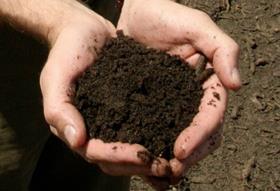
The government needs to invest £10 million a year to protect England's soils and ensure future food security, a new report has advised.
The study by WWF, The Rivers Trust and The Angling Trusts claims that soil erosion and the pollution of waterways is jeopardising the future of England’s farming industry and the cleanliness of its water supply.
There is an “economic, environmental and farm productivity benefit” to preventing soil degradation, according to the report’s authors, who set out a nine-point plan for improving the health of the UK’s soil and water.
Defra estimates cited in the report suggest that poor farming practices and land-use choices are causing soil to be destroyed at around 10 times the rate it is being created, costing England and Wales an estimated £1.2 billion a year.
In some areas, agricultural output could drop from £480 to £30 a hectare over the next 60 years, the report claims. Meanwhile, only 14 per cent of England’s rivers were classed as healthy by the Environment Agency in 2016.
WWF research has found that up to a third of farmers are currently non-compliantwith England's water protection laws. And according to the charity, this has led to widespread soil degradation, agricultural pollution of our rivers,increased flood risk to homes and businesses, and higher costs for local authorities and water bill payers.
The problem has been made worse by a lack of enforcement, the report claims, since the Environment Agency's current resources only allow them to visit and inspect less than one per cent of farms a year.
WWF is calling for “a fair set of farming rules underpinned by credibleenforcement”, and it estimates that effective enforcement and advice in Englandwould cost the government about £10m a year.
Tony Juniper, executive director of advocacy and campaigns at WWF, said: “We have a once in a life time opportunity to create and support the nature we want to live in. We could have a farming system that contributes to a healthier planet. But to do that, we have to thinklocally, byrestoring our wildlife andstopping agricultural run-offpollutingour rivers.
“We need to not only put in place the right legislation and protections, but we must have robust enforcement or else we will waste this unique occasion.”
The report’s authors stress that Brexit gives the government a “once-in-a-generation” opportunity for government to use farming subsidies to deliver public goods. And the government has been placing greater importance on the issue of soil health in recent months.
In March, Defra indicated that the upcoming agricultural bill, expected to be published this year, would for the first time contain targets and measures to improve the health of Britain’s soils.



